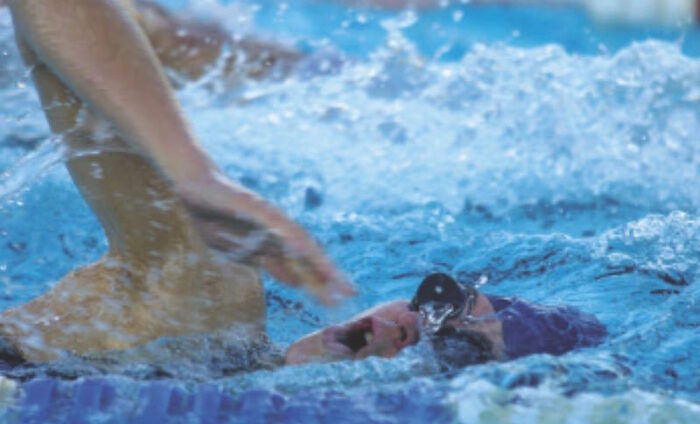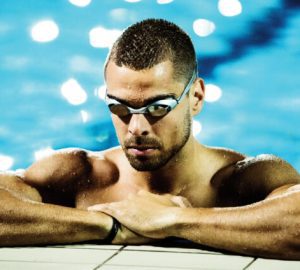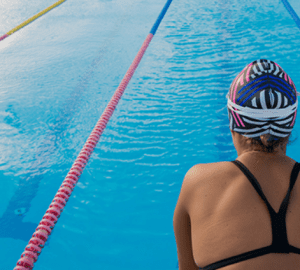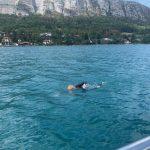
Training session – medium distance
For medium distances, try the second of our training sets from Fiona Ford
Have you already signed up for a race or event this summer? We’ve come up with three pool-based training sessions for short, medium and long distance swimmers to help you achieve your swimming goals. Short distance we’ve taken as 750m to 1600m (1 mile). Medium distance is up to around 5km, a popular race distance. Long distance swimmers are often in the water for in excess of two hours where aerobic efficiency (the ‘diesel engine’ as Swim Smooth calls it) becomes critical. Include one of these sessions in your weekely training to help build speed and endurance.
The core block of each session is designed around your Critical Swim Speed or CSS pace and can therefore be used whatever your speed (to learn more about CSS and how to calculate it see swimsmooth.com/training.html).
Medium distance (3km to 5km)
Warm up: 3x200m FS (+10 sec rest)
Focus on exhalation and BB every
3 strokes, incorporate at least 50m
(on each 200m) breathing every 5
strokes to extend your exhalation
capabilities
Build set: 8x50m (+10 sec)
swimming with an ankle band
or wearing shorts, overcome
the resistance or drag issues by
focusing on optimising your catch
and pull and streamlining your body
and leg positioning. Stay ‘in the
moment’ on each length and focus
on improving efficiency a bit further
each time
Main set: (repeat two to three
times)
200m FS swim as a negative split,
going out below CSS pace and then
increasing to swim at CSS on the
second 100m +15 sec
4x100m PULL @ CSS pace +10 sec
200m FS swim as positive split,
going out fast on the first 100m and
then settling into CSS pace on the
second 100m +15 sec
2 to 4x100m as IM in order of FLY,
BS, BRS, FS +15 sec. Fins optional.
Substitute FLY drill or kick for FLY
stroke if necessary +15 sec
400m FS drafting with a partner
or small group of four swimmers.
Swap the lead every 100m. Lead
swimmer to swim slightly faster
than CSS pace; drafting swimmer(s)
to practise effective drafting on hips or feet of lead swimmer. Practise breathing towards each other (UB 2 or 4 strokes), increasing adversity factors by ‘squeezing’ each other into the lane ropes or turning fast or unpredictably off line seeking a better drafting position from the wall turns. +30 sec rest.
Cool down: 200-400m easy, incorporate at least 100m BS
Total: 4000-5800m
Why different swim strokes?
The benefits of utilising other strokes are numerous. Physiologically it allows the swimmer to utilise and develop a range of muscle groups and functional strength. This is useful particularly for distance open water freestyle swimming to avoid overuse injuries. Psychologically swimmers of all abilities and distances gain a competitive advantage, gaining confidence mastering or further developing new skills and becoming adaptive with the demands of switching between strokes and experiencing high levels of muscular fatigue. Ultimately a good way to simulate the ever changing demands of open water swimming, in a pool training environment and being able to progressively improve the process of ‘mind over matter’ to apply as required when adverse situations demand!
Guidance notes
CSS – Critical Swim Speed. Effectively training at your threshold pace provides you with significant speed efficiency gains
Pacing – using the pool clock, your own stopwatch or a timing device such as a Finis Tempo Trainer or Metronome
BB = Bilateral Breathing
UB = Unilateral Breathing
BS = Backstroke FS = Freestyle or front crawl
BRS = Breast- stroke
FLY = Butterfly
PULL = Swimming with a pullbuoy or float between your legs. No kicking.
Swim Smooth squad training and video analysis sessions
Triathlon Europe provides weekly Swim Smooth squad training in South West London. The squad enjoy training all year round in fabulous indoor and outdoor 33m pools. Fiona offers swim training plans, 1-2-1 video analysis sessions and stroke correction sessions on weekday mornings and weekend Swim Smooth workshops.
Find out more: triathloneurope.com







